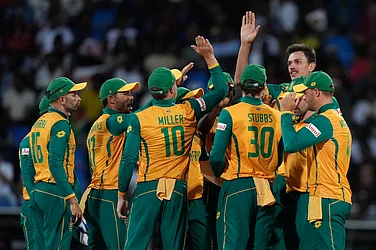- Two golds in 10m air pistol and 50m pistol
- Three team golds
- One team silver and one individual bronze
- Sets three new games records, wins David Dixon Award
***
Tennis aces Leander Paes and Mahesh Bhupathi are known to be flamboyant heroes. We have revered the chess genius Vishwanathan Anand as the erudite hero. India’s cricket captain Rahul Dravid is perceived as the gentleman hero. Tennis princess Sania Mirza and the dashing wicket-keeper batsman Mahendra Singh Dhoni are good examples of instant heroes, blitzing to stardom.
As a low-key figure who has been around for a dozen years at the competitive level but has always lurked in the shadows of shooters like Jaspal Rana, Ashok Pandit, Anjali Vedpathak Bhagwat and Rajyavardhan Singh Rathore, pistol ace Samaresh Jung does not quite fit into any of these pigeon-holes. And we have scratched our heads hard and long to be able to think of positioning this champion anywhere.
Wait, perhaps you could brand him as the reticent hero. Those who know the reclusive Delhi-based Himachali shooter well enough say that he prefers not to speak much, usually either nodding a gentle yes or an even gentler no. Samaresh had promised an eight-gold medal haul at the Commonwealth Games in Melbourne and is returning home with five golds, a silver and a bronze, as well as the prestigious David Dixon trophy for the Best Athlete of the Games. The Games Village volunteers have reportedly named him Goldfinger.
Few non-cricketers have caught the imagination of sports-lovers in India as the 36-year-old Jung did in the past fortnight. When he returns after the ISSF World Cup competition at Guangzhou in China, he will certainly be accorded a welcome reserved for a conquering hero. After all, not even Jaspal Rana’s four-gold effort at the Commonwealth Games in Manchester four years ago drew as much attention. In fact, no Indian sportsperson could boast of richer pickings in a fortnight. Certainly not since the legendary P.T. Usha won four golds at the Seoul Asian Games in 1986.
The CISF inspector’s seven-medal effort was the icing on the cake for the Indian shooting contingent that landed as many as 16 gold medals in Australia. The Samaresh Jung show also helped take away some of the attention from the alleged sexual assault by an Indian team masseur and from the latest doping scandal as well—Edwin Raju and Tejinder Singh are reported to have tested positive for banned drugs.
Of course, the more pragmatic observers will point out—without taking any of Samaresh Jung’s achievements away from him—that the shooting competition at the Commonwealth Games was not quite world-class. Besides, pairs’ events (and he won three golds in such events) are quite unique to the Commonwealth Games.
For all that, to describe a champion as simple and unassuming may sound cliched but they fit Samaresh Jung aptly. He has shown that diligence and perseverance can bring their own sweet rewards in good time. He may come across as reclusive and reticent because of his temperament but surely not reluctant. "I think my shooting was not very good. I didn’t feel very good so I could have improved a couple of points here," he said after settling for bronze in the 25m centrefire event, demonstrating a hunger to improve—something rare for Indian sportspersons.
Of course, Samaresh realises that he will have to deliver more consistent results in stiffer competitions than the Commonwealth Games. And that means nearly everywhere else: from the ISSF World Cup competitions to the World Championship, from the Asian Games to the Olympic Games. On the international rankings, he is ranked in the 60s in the 10m air pistol ranking, but is slotted at No. 20 in the 50m pistol event. But with the right preparation, he may well get a berth at the 2008 Olympic Games and repeat his multiple medal feat of the Asian Games.
He led the shooters in the 50-metre free pistol gold medal match in Melbourne with a score of 554. Less than a week later, at the World Cup in China, his score dipped to 548 and he was stranded some distance from making it to the final. Shooting as a sport can be most demanding, punishing even the slightest of errors. After all, he missed qualifying for the Athens Olympic Games despite shooting 556 and 97.3 in the medal round at the ISSF World Cup in Changwon, South Korea.
His father Shailesh Jung, a retired colonel, while speaking of Samaresh’s training, said, "He has learnt from national coach Tibor Gonczol, fellow shooters, making mistakes and reading books." One of the key lessons the Hungarian coach Gonczol taught Samaresh—and the other pistol shooters too—is the fact that every marksman, big or small, would feel pressure. Samaresh recalls Gonczol saying "Only two kind of people don’t feel pressure. They must either be fools or dead."
"He started shooting as a hobby and enjoys it immensely now. He got a gold medal in 1994 and that egged him on," says Shailesh Jung. "He has never looked back since. Samaresh has always worked very hard and he is continuing with that form. He does his work with dedication and doesn’t worry about the monetary rewards that may follow."
That is not a vain boast. Samaresh had two gold and three silver at the Manchester Games in 2002 and reaped a Rs 70 lakh incentive from the ministry of sports. He then said the announcement of Rs 1 crore for a gold medal winner at the Olympic Games was a big incentive but if the same amount were spent on providing better facilities, India could actually win more medals.
Come to think of it, Samaresh Jung nurses an Olympic dream. And he knows that with the right approach, it is possible he can end up doing something special at the Olympic Games in Beijing in 2008. But first, there remains the small matter of securing the quota place—and the Asian Games as well. He couldn’t be bothered if some of us are still scratching our heads, figuring out which pigeon-hole to slot him in.


























